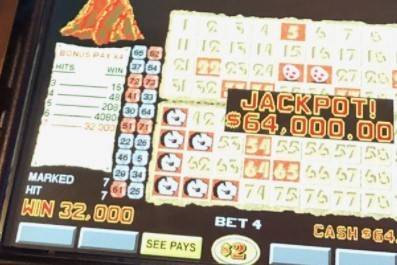An online keno game is much the same as any other form of the keno game. You select numbers and hope that a lot of them are chosen … The odds are … on the amount of numbers you select to
- To increase KENO winnings, add the Booster® for another $1 for each $1 wagered. You can play up to 20 consecutive drawings on one bet card. Win by matching your number (s) to the 20 numbers selected by the Ohio Lottery. Tickets can be purchased 7 days a week during normal gaming hours.
- Check the latest Keno winning numbers here on PlayNow.com. There are thousands of Keno winners every day in BC. With the live draws happening every 3:30 minutes you could win up to $200,000.
An online keno game is much the same as any other form of the keno game. You select numbers and hope that a lot of them are chosen correctly. The odds are calculated on the number of numbers you select for the next round. To win, you have to beat the odds. Playing a keno game online is very simple. Keno's appeal and popularity stem from its simplicity. It can be mastered within a few minutes and can be played by anyone. The possibility that a lot of money can be won in only a short amount of time adds appeal and allure to the game. The amount you get right or wrong will determine if you win or lose. It is a very simple game in that all you do is pick numbers and watch the screen to see if you're a winner.
Michigan Lottery Site.
Promotion Keno w88
W KENO HIGH ROLLOVER
TERMS & CONDITIONS
This promotion starts from 02 September 2019 00:00:00 (GMT+8) until 08 September 2019 23:59:59 (GMT+8).
This promotion only applies to members with registered IDR, MYR, RMB, THB, USD & VND currency.
This promotion is applicable for W Keno only.
During the promotion period, members can claim the bonus if member fulfills the following conditions:
VIP CATEGORY PREVIOUS WEEK TOTAL WAGER BONUS RATIO MAX BONUS PAYOUT
VIPB + VIPG ≥ 25,000 25% $150
VIPP + VIPD ≥ 35,000 30% $250
Members need to click on 'Claim Now' to claim on the promotion; a member can only claim once a week.
Qualified members will receive the Bonus Code through pMessage within 2 workings days after the promotion has ended.
Qualified members that received the Bonus Code can only use the Bonus Code in the given week.
Once member deposited and transfer the money into the Keno Wallet, please key-in the Bonus Code sent to you in the Bonus Code section.
Draw result, both sides bet, void, canceled game are not eligible for this promotion.
W88 reserves the rights to cancel the promotion to all or selected members.
W88 General Promotions Terms & Conditions apply.
keno
ke no
kino lotto
keno plus
keno resultats du jour
keno e
keno 24
keno resultados
keno tedesco
niemieckie keno
lotto kino
www keno belge
keno loteria
finska keno
kenno lotto
keno servis
keno niemieckie
rezultate keno
keno excel
keno 19
resultats keno belge

Keno/kiːnoʊ/ is a lottery-like gambling game often played at modern casinos, and also offered as a game by some state lotteries.
Players wager by choosing numbers ranging from 1 through (usually) 80. After all players make their wagers, 20 numbers (some variants draw fewer numbers) are drawn at random, either with a ball machine similar to ones used for lotteries and bingo, or with a random number generator.
Keno Web Camera Colorado
Each casino sets its own series of payouts, called 'paytables'. The player is paid based on how many numbers were chosen (either player selection, or the terminal picking the numbers), the number of matches out of those chosen, and the wager.
There are a wide variety of keno paytables depending on the casino, usually with a larger 'house edge' than other games offered by that casino. The house edge ranges from less than 4 percent[1] to over 35 percent.[2] The typical house edge for non-slot casino games is under 5 percent.[3]
History[edit]
The word keno has French or Latin roots (Fr. quine 'five winning numbers', L. quini 'five each'), but by all accounts the game originated in China. Legend has it that the invention of the game saved an ancient city in time of war, and its widespread popularity helped raise funds to build the Great Wall of China. In modern China, the idea of using lotteries to fund a public institution was not accepted before the late 19th century.[4]
Chinese lotteries are not documented before 1847 when the Portuguese government of Macau decided to grant a license to lottery operators. According to some, results of keno games in great cities were sent to outlying villages and hamlets by carrier pigeons, resulting in its Chinese name 白鸽票 báigē piào, literally 'white dove ticket', pronounced baak-gap-piu in Cantonese (on which the Western spelling 'pak-ah-pu' / 'pakapoo' was based).
The Chinese played the game using sheets printed with Chinese characters, often the first 80 characters of the Thousand Character Classic, from which the winning characters were selected.[5][6] Eventually, Chinese immigrants introduced keno to the US in the 19th century,[7] where the name was Westernized into boc hop bu[6] and puck-apu.[5] By 1866, it had already become a widely popular gambling game in Houston, Texas, under the name keno.[8]
Probabilities[edit]
Keno payouts are based on how many numbers the player chooses and how many of those numbers are 'hit', multiplied by the proportion of the player's original wager to the 'base rate' of the paytable. Typically, the more numbers a player chooses and the more numbers hit, the greater the payout, although some paytables pay for hitting a lesser number of spots. For example, it is not uncommon to see casinos paying $500 or even $1,000 for a 'catch' of 0 out of 20 on a 20 spot ticket with a $5.00 wager. Payouts vary widely by casino. Most casinos allow paytable wagers of 1 through 20 numbers, but some limit the choice to only 1 through 10, 12, and 15 numbers, or 'spots' as the numbers selected are known.[9]
The probability of a player hitting all 20 numbers on a 20 spot ticket is 1 in 3,535,316,142,212,174,320.[10]
Even though it is virtually impossible to hit all 20 numbers on a 20 spot ticket, the same player would typically also get paid for hitting 'catches' 0, 1, 2, 3, and 7 through 19 out of 20, often with the 17 through 19 catches paying the same amount as the solid 20 hit. Some of the other paying 'catches' on a 20 spot ticket or any other ticket with high 'solid catch' odds are in reality very possible to hit:
| Hits | Probability |
|---|---|
| 0 | 1 in 843.380 |
| 1 | 1 in 86.446 |
| 2 | 1 in 20.115 |
| 3 | 1 in 8.009 |
| 4 | 1 in 4.877 |
| 5 | 1 in 4.287 |
| 6 | 1 in 5.258 |
| 7 | 1 in 8.826 |
| 8 | 1 in 20.055 |
| 9 | 1 in 61.420 |
| 10 | 1 in 253.801 |
| 11 | 1 in 1,423.822 |
| 12 | 1 in 10,968.701 |
| 13 | 1 in 118,084.920 |
| 14 | 1 in 1,821,881.628 |
| 15 | 1 in 41,751,453.986 |
| 16 | 1 in 1,496,372,110.872 |
| 17 | 1 in 90,624,035,964.712 |
| 18 | 1 in 10,512,388,171,906.553 |
| 19 | 1 in 2,946,096,785,176,811.500 |
| 20 | 1 in 3,535,316,142,212,174,320.000 |
Probabilities change significantly based on the number of spots that are picked on each ticket.
References[edit]
- ^Online Keno odds
- ^Shackleford, Michael. 'Keno - Strategy and Odds by The Wizard of Odds'. Wizard of Odds Consulting, Inc. Retrieved 21 July 2010.
- ^Casino advantages for various games
- ^'Keno History'. kenoonline.org. Retrieved 9 June 2015.
- ^ abMelanie Yap, Dianne Leong Man. Colour, confusion and concessions, pp.240-241.
- ^ ab'Chinese Gambling Games; Mysteries of Fan Tan And Boc Hop Bu. Two Popular Games in the Chinese Quarters of American Cities-- Superstitions of the Players. Boc Hop Bu. Superstitions'(PDF). The New York Times. 5 February 1888.
- ^History of Keno. Transl. from German, 2017.
- ^'The New York Times'. 29 July 1866.Cite journal requires
|journal=(help) - ^'Tutorial - How to play Keno'. Gambling Info. Retrieved 27 June 2011.
- ^Mark Bollman (2014). Basic Gambling Mathematics: The Numbers Behind the Neon. CRC Press. pp. 40–41. ISBN9781482208931.
Keno Weather

Keno/kiːnoʊ/ is a lottery-like gambling game often played at modern casinos, and also offered as a game by some state lotteries.
Players wager by choosing numbers ranging from 1 through (usually) 80. After all players make their wagers, 20 numbers (some variants draw fewer numbers) are drawn at random, either with a ball machine similar to ones used for lotteries and bingo, or with a random number generator.
Keno Web Camera Colorado
Each casino sets its own series of payouts, called 'paytables'. The player is paid based on how many numbers were chosen (either player selection, or the terminal picking the numbers), the number of matches out of those chosen, and the wager.
There are a wide variety of keno paytables depending on the casino, usually with a larger 'house edge' than other games offered by that casino. The house edge ranges from less than 4 percent[1] to over 35 percent.[2] The typical house edge for non-slot casino games is under 5 percent.[3]
History[edit]
The word keno has French or Latin roots (Fr. quine 'five winning numbers', L. quini 'five each'), but by all accounts the game originated in China. Legend has it that the invention of the game saved an ancient city in time of war, and its widespread popularity helped raise funds to build the Great Wall of China. In modern China, the idea of using lotteries to fund a public institution was not accepted before the late 19th century.[4]
Chinese lotteries are not documented before 1847 when the Portuguese government of Macau decided to grant a license to lottery operators. According to some, results of keno games in great cities were sent to outlying villages and hamlets by carrier pigeons, resulting in its Chinese name 白鸽票 báigē piào, literally 'white dove ticket', pronounced baak-gap-piu in Cantonese (on which the Western spelling 'pak-ah-pu' / 'pakapoo' was based).
The Chinese played the game using sheets printed with Chinese characters, often the first 80 characters of the Thousand Character Classic, from which the winning characters were selected.[5][6] Eventually, Chinese immigrants introduced keno to the US in the 19th century,[7] where the name was Westernized into boc hop bu[6] and puck-apu.[5] By 1866, it had already become a widely popular gambling game in Houston, Texas, under the name keno.[8]
Probabilities[edit]
Keno payouts are based on how many numbers the player chooses and how many of those numbers are 'hit', multiplied by the proportion of the player's original wager to the 'base rate' of the paytable. Typically, the more numbers a player chooses and the more numbers hit, the greater the payout, although some paytables pay for hitting a lesser number of spots. For example, it is not uncommon to see casinos paying $500 or even $1,000 for a 'catch' of 0 out of 20 on a 20 spot ticket with a $5.00 wager. Payouts vary widely by casino. Most casinos allow paytable wagers of 1 through 20 numbers, but some limit the choice to only 1 through 10, 12, and 15 numbers, or 'spots' as the numbers selected are known.[9]
The probability of a player hitting all 20 numbers on a 20 spot ticket is 1 in 3,535,316,142,212,174,320.[10]
Even though it is virtually impossible to hit all 20 numbers on a 20 spot ticket, the same player would typically also get paid for hitting 'catches' 0, 1, 2, 3, and 7 through 19 out of 20, often with the 17 through 19 catches paying the same amount as the solid 20 hit. Some of the other paying 'catches' on a 20 spot ticket or any other ticket with high 'solid catch' odds are in reality very possible to hit:
| Hits | Probability |
|---|---|
| 0 | 1 in 843.380 |
| 1 | 1 in 86.446 |
| 2 | 1 in 20.115 |
| 3 | 1 in 8.009 |
| 4 | 1 in 4.877 |
| 5 | 1 in 4.287 |
| 6 | 1 in 5.258 |
| 7 | 1 in 8.826 |
| 8 | 1 in 20.055 |
| 9 | 1 in 61.420 |
| 10 | 1 in 253.801 |
| 11 | 1 in 1,423.822 |
| 12 | 1 in 10,968.701 |
| 13 | 1 in 118,084.920 |
| 14 | 1 in 1,821,881.628 |
| 15 | 1 in 41,751,453.986 |
| 16 | 1 in 1,496,372,110.872 |
| 17 | 1 in 90,624,035,964.712 |
| 18 | 1 in 10,512,388,171,906.553 |
| 19 | 1 in 2,946,096,785,176,811.500 |
| 20 | 1 in 3,535,316,142,212,174,320.000 |
Probabilities change significantly based on the number of spots that are picked on each ticket.
References[edit]
- ^Online Keno odds
- ^Shackleford, Michael. 'Keno - Strategy and Odds by The Wizard of Odds'. Wizard of Odds Consulting, Inc. Retrieved 21 July 2010.
- ^Casino advantages for various games
- ^'Keno History'. kenoonline.org. Retrieved 9 June 2015.
- ^ abMelanie Yap, Dianne Leong Man. Colour, confusion and concessions, pp.240-241.
- ^ ab'Chinese Gambling Games; Mysteries of Fan Tan And Boc Hop Bu. Two Popular Games in the Chinese Quarters of American Cities-- Superstitions of the Players. Boc Hop Bu. Superstitions'(PDF). The New York Times. 5 February 1888.
- ^History of Keno. Transl. from German, 2017.
- ^'The New York Times'. 29 July 1866.Cite journal requires
|journal=(help) - ^'Tutorial - How to play Keno'. Gambling Info. Retrieved 27 June 2011.
- ^Mark Bollman (2014). Basic Gambling Mathematics: The Numbers Behind the Neon. CRC Press. pp. 40–41. ISBN9781482208931.

